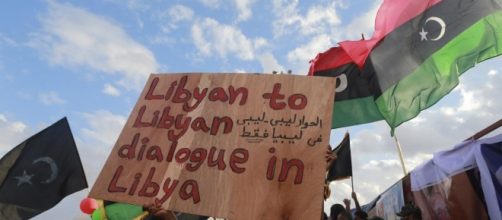After the horrific atrocities and Manchester, #British Foreign Policy, particularly in #Libya, has come under renewed scrutiny, while in Manchester, the #Libyan community has been trying to come to terms with the attacks. Trying to understand Salam Abedi's radicalisation has led analysts and politicians to take a fresh look at the situation in #Libya after it emerged that Abedi had spent a considerable amount of time.
Libya in state-of-anarchy
Following the demise of Kernel Gaddafi, the UN-backed government has been unable to provide social, political, and economic stability.
In fact, utter anarchy and chaos are prevailing in #Libya today.
Speaking at a Royal United Services Institute event, #Tobias Ellwood, conceded that the "UK could have done more" to prevent the country descending into a state of chaos following Western intervention in 2011. However, he defended the RAF airstrikes and went on to describe that "the international community was asked to take a step back from its involvement" after the establishment of a general national congress and the election of the Prime Minister.
Today, three different warring governments are fighting to gain control of the country, along with countless militias and ISIS fighters. Many analysts now consider #Libya's state of non-governance as a prime breeding ground for terrorism.
Ellwood went on to call on the international community to work with the Libyans so that ISIS "is not able to train those people that cause the harm in places like Manchester."
At the same event, #Emily Thornberry reiterated #Jeremy Corbyn's comments, urging everyone to re-examine British foreign policy in light of the atrocities. She expressed the view that "failure of Libya... directly leads to us being less safe."
Libyan community in Manchester horrified at the attacks
The Libyan community has been struggling to come to terms with the attacks. Members of the Libyan community and attendees at the Didsbury Mosque still can't quite understand how a member of their community could have committed such a shocking crime.
Speaking to Aljazeera reporters, some described Abedi as somewhat of an outsider who was often under the influence of cannabis. Where precisely Abedi was radicalised remains unclear, although some believe he was primarily radicalised by online ISIS propaganda, while also making contact with ISIS during his visits to Libya.
Also speaking to Aljazeera, Ali Mahmoud, another Libyan from Manchester, went on to stress that although some members of their community had joined in the struggle against Gaddafi, the uprising was simply a revolution against a dictator rather than an Islamic revolution: "It was against a dictator and you had people from different strands of society coming together against him."
When asked if Abedi had displayed any signs of radicalisation, Mahmoud said: "I don't think you can tell who's a (ISIS) sympathiser, but there were no clear signs."


